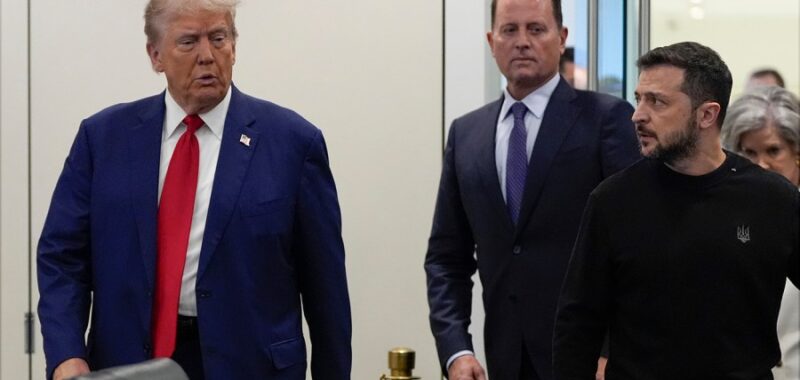
President Trump ratcheted up his attacks on Ukrainian President Volodymyr Zelensky on Friday, deepening the first real schism of his second term within the GOP.
Appearing on the “Brian Kilmeade Show” on Fox News Radio, Trump said of Zelensky, “I’ve been watching for years, and I’ve been watching him negotiate with no cards. He has no cards, and you get sick of it. You just get sick of it. And I’ve had it.”
That jab came on top of a series of Trump comments earlier this week, and talks in Saudi Arabia where representatives of the United States and Russia met, in the absence of any representative from Ukraine.
During former President Biden’s administration, Washington placed great emphasis on the fact that an end to the war, sparked by Russia’s February 2022 invasion of its neighbor, would only come on terms with which the government of Ukraine agreed.
But during his Friday radio interview, Trump dismissed the need to have Zelensky involved in talks, saying he did not think the Ukrainian president was “very important to be at meetings, to be honest with you.”
With words like that, Trump fanned the flames of a storm that has consumed much of the week. He has appeared to echo Kremlin narratives of the war and placed much of the blame for the conflict on Ukraine.
In the process, Republican and conservative voices have been raised against him in a way that has not previously been seen in the first weeks of his second term.
Even as all that took place, however, there were reports that the administration and its Ukrainian counterparts were on the brink of a deal that would grant the U.S. mineral rights in exchange for Washington’s continued aid.
On Tuesday, Trump had said “you should have never started it” regarding the war. While it wasn’t fully clear whether Trump was referring to Ukraine generally or Zelensky personally, it was an extremely provocative claim, given that Russia currently occupies roughly one-fifth of Ukraine’s territory, continues to push for more, and has been an aggressor dating back to at least its 2014 annexation of Crimea.
Russia has presented the invasion as a defensive maneuver to counter creeping expansionism by NATO. Ukraine is not a member of the alliance, and the issue of whether the eastern European nation might be allowed to become one is deeply contentious.
Last week, even before the Trump-Zelensky war of words reached its current pitch, Trump said he didn’t “see any way that a country in Russia’s position…could allow them to join NATO. I don’t see that happening.”
Trump added, “I believe that’s the reason the war started.”
Matters escalated, however, when Zelensky alleged that Trump was “living in this disinformation space” and that he wanted “more truth” from the American president.
In a furious social media post, Trump then called Zelensky a “Dictator without Elections” who was “very low in Ukrainian polls,” said he had “talked the United States of America into spending $350 billion,” and contended that the Ukrainian leader “admits that half of the money we sent him is ‘MISSING.’”
Zelensky was elected in 2019, winning roughly 75 percent of the vote in the runoff. He has postponed elections since the nation is under martial law — a provision enabled by the Ukrainian Constitution.
Zelensky’s approval rating in Ukrainian polls is typically in the mid-50 percent range. U.S. aid to Ukraine is about half of the figure Trump cited. And the Ukrainian president did not say that aid has been delivered and has gone missing; he referred to the fact that the full extent of aid promised by Washington has not yet arrived.
Trump’s fusillade sparked some normally supportive Republicans to express dissent.
Senate Majority Leader John Thune (R-S.D.) told Fox News Radio, “[Russian President Vladimir] Putin and Russia are very clearly the aggressor in this conflict. That’s just a fact.”
Sen. John Kennedy (R-La.) said, “To the extent that the White House said that Ukraine started the war, I disagree.”
Sen. John Curtis (R-Utah) wrote on social media that he, like Trump, wanted an end to the war, but added: “It must end on terms that bring lasting stability and peace. That means ensuring Vladimir Putin does not walk away with a victory.”
The contours of the debate reveal the big fault lines still evident in a GOP that Trump has largely taken over.
On foreign policy, more traditional, hawkish Republicans still hold considerable sway, especially in the Senate. Their worldview in general, and their views of Putin’s Russia in particular, are starkly at odds with Trump’s “America First” isolationism and what critics see as a peculiar fondness for the Russian leader.
The divide extends into a conservative media that is, on other matters, reliably supportive of Trump.
Conservative radio talk show host Mark Levin on Wednesday wondered why Putin gets “to call the shots, when in fact he murders people who dare to challenge him.”
Levin also noted, in implicit criticism of Trump, “Ukraine did not invade Russia. Russia invaded Ukraine … What were they supposed to do? Roll over and play dead?”
As usual, however, Trump appears to be in no mood for turning back.
He is betting, in part, that the American people have tired of the expense of supporting Ukraine, especially when there is no obvious end in sight to the war, except for a negotiated settlement.
It’s not necessarily a losing bet, though American public opinion on the conflict is complicated.
An Economist/YouGov poll this week found that 30 percent of Americans favor decreasing aid to Ukraine, 21 percent favor increasing it, and 29 percent want aid maintained at its current levels.
But Trump for now seems adamant about pushing for a deal to end the war, whether its on terms that Zelensky wants or not.
The question is whether his fellow Republicans will swallow their doubts or continue to declare them.
The Memo is a reported column by Niall Stanage.

